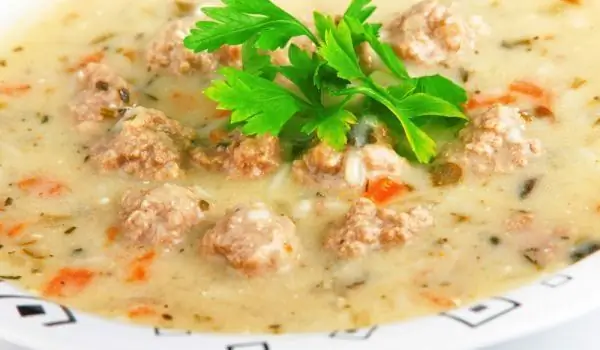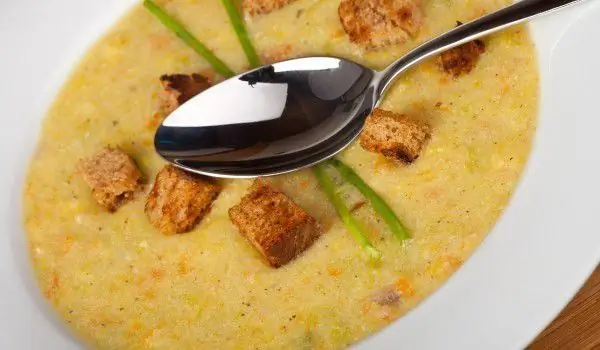2025 Author: Jasmine Walkman | [email protected]. Last modified: 2025-01-23 10:18
Soups and home-made broths are a necessary food for young children. This is because of the small amount of protein, fat and carbohydrates they contain. Soups and broths, especially meat, increase gastric secretion and improve digestion.
Following some simple but basic rules in the preparation of soups and broths for young children up to three years of age will bring many health benefits and improve the tone and activity of the child.
When preparing meat soup or broth, poultry is preferred. To obtain a complete broth, the washed and cut pieces of meat and bones are poured with cold water. Cover well and after boiling and frothing are salted and left to simmer. Rapid cooking leads to loss of aromatic components of meat and vegetables.
If the meat is placed in boiling salted water, then due to the high temperature the proteins on the surface of the meat coagulate and form a shell, which stops the passage of salts and other substances. They remain in the meat and the broth remains low in nutritional value.
For all other meats other than chicken, one hour before removing from the heat, add the cleaned and chopped vegetables, which enrich the broth.
Vegetarian broths also require vegetables to be placed in cold water without being pre-soaked. Vegetarian broth can also be prepared from stewed finely chopped vegetables in fat and water. In this way, the essential oils and vitamin A, which are contained in vegetables, are extracted.
From the broths prepared in this way, various soups are made with the addition of eggs, noodles, rice, bakery products and others.
If the cooked vegetables are mashed, a cream soup is obtained. If Béchamel sauce or toasted flour with milk and eggs is added to the pureed soup, a cream soup is obtained. Pureed and cream soups are recommended for children from 1 to 2 years of age.
In the preparation of soups for children it is desirable to avoid frying. It is recommended to use butter instead of other fat, which should be added shortly before serving.
It should be approached very carefully with the addition of spices in soups for young children. Leafy spices are recommended.
It is good not to add bread to the soup.
Due to the lower nutritional value of soups and broths, children from 1 to 3 years are recommended to be given small amounts up to 100 g to allow the child to eat the main dish with dessert.
Recommended:
Culinary Mistakes And Rules In The Preparation Of Broths And Soups

If the water with which the meat is poured, when it is boiled, is cold, a delicious broth is obtained, and from it a delicious soup and a delicious soup. While the water is boiling, a large part of the nutrients and flavors of the meat are extracted in it and a delicious broth is obtained.
Useful Soups For Gastritis And Sick Stomach

Gastritis is an inflammation of the lining of the stomach and is most often caused by stress and poor nutrition. If you suffer from this disease, you should be careful about what you eat, and it is best to completely change your menu by including foods that reduce the acidity in the stomach and do not irritate the mucous membranes.
Soups And Broths For Diabetics

People with diabetes can enjoy delicious soups that are healthy and pleasing to the eye with their pleasing appearance. Such a soup is made, for example, from zucchini. Ingredients: 1 zucchini, 1 carrot, 2 onions, 2 potatoes, oil, 100 grams of cheese, salt and spices to taste.
Grandma's Rules For Delicious Soups And Soups With Stuffing And Building

Soups and broths are prepared from a variety of products: meat, poultry, vegetables, fish, legumes, pasta and fruits. Soups and broths are divided into two groups: with stuffing and with building. Some of the lean and local soups are made with stuffing, such as:
Homemade Popcorn: More Delicious And Useful

Where did the traditions go and do your children even know how we popped our popcorn when we were children - without the help of a microwave and special packages. The answer is probably NO. We all love and eat popcorn often, but no one tries to grow corn on their own, pick the cobs and peel the tiny grains from them.

